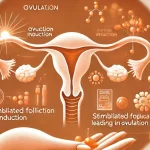Congratulations, you're expecting a little one! At Midwives Lelystad we know all too well that being pregnant often feels like a roller coaster of emotions, miracles and yes, also a lot of physical changes. We see it every day in our practice: the joy, the uncertainty, but especially the growing miracle. And that miracle involves many everyday physical changes that sometimes raise questions. “Is this normal?” we often hear. Spoiler: usually yes.
In this article we delve into the world of the everyday physical changes during pregnancy. We take you along those wonderful, sometimes uncomfortable, but above all beautiful changes that your body goes through when it accommodates new life. From morning sickness to mood swings and from pregnancy glow to those inevitable visits to the bathroom in the middle of the night – we discuss it all.
Are you ready for this adventure? Great, let's walk through this special journey together, with all the highs and lows. And remember: at Midwives Lelystad you are never alone. Let's start!
Cramps in the legs
Expectant mothers often experience unexpected muscle cramps, especially during the second and third trimesters of pregnancy. These nighttime cramps can abruptly pull you out of your sleep and range from mildly uncomfortable to almost unbearable. But don't worry, there are ways to ease the frequency and intensity of these cramps!
Here are some tips to avoid those annoying ones leg cramps to help prevent or alleviate:
-
- Ensure sufficient exercise during the day; a simple walk can do wonders.
-
- Avoid standing or sitting in the same position for long periods of time; try to change your position regularly.
-
- Stretch and massage your calf muscles before bedtime. This can help relax the muscles.
-
- Make sure you get enough electrolytes, such as magnesium, potassium and calcium. These are crucial for good muscle function.
-
- Hydrate well by drinking enough water throughout the day.
In case of persistent or very painful cramps, it is advisable to contact your midwife. Together you can see whether additional measures are needed to alleviate the complaints. Remember that every pregnancy is unique, and what works for one person won't necessarily work for another. Listen carefully to your body and give it the care and rest it needs during this special time.
Constipation
During pregnancy the digestive system can be put to the test, including: blockage is a common problem. This discomfort is mainly caused by the hormonal changes that your body is undergoing. The hormone progesterone, which occurs in higher concentrations during pregnancy, makes the muscles of your intestines lazier, which slows down transit speed and allows waste products to remain in your body longer. In addition, the growing uterus can put pressure on your intestines, further complicating the situation. sometimes made difficult.
To combat this blockage, there are some simple steps you can take. Start recording more fiber-rich diet in your diet; think of fruit, vegetables, whole grain products and legumes. Fibers help stimulate your intestinal movements. It is also important to to drink plenty of water; dehydration can make constipation worse. Try in addition engage in light exercise regularly, such as walking, which can help promote digestion. Below is a handy overview to incorporate these advice into your daily routine:
| Tips against constipation | How to implement |
|---|---|
| Fiber-rich food | Add a piece of fruit to your breakfast every day and choose whole wheat bread for lunch. |
| Hydration | Take a water bottle with you everywhere and set goals to fill and empty it several times throughout the day. |
| Light exercise | Plan daily walks, possibly with a partner, friend or neighbor. |
It is normal to experience minor physical discomfort during pregnancy, but by paying attention to your diet and lifestyle you can reduce or prevent many of these complaints. If the blockage persists or becomes serious, do not hesitate to contact your midwife or doctor. They may recommend additional advice or possibly safe medication to provide relief.
Dark spots on the face
A common phenomenon during pregnancy are pigment spots, officially known as melasma or the “pregnancy mask”. These spots usually appear on the forehead, cheeks and around the lips. They are caused by hormonal changes that affect the production of melanin, the pigment that colors our skin, hair and eyes. Although they don't hurt, some women may find them disturbing. The good news? They often fade after delivery!
Tips to minimize these pigment spots:
-
- Avoid direct exposure to the sun and wear a hat or use an umbrella when outdoors.
-
- Use a sunscreen with a high protection factor (SPF 50 or higher) that blocks both UVA and UVB rays.
-
- Moisturize your skin well with products that are safe for pregnant women, without vitamin A in them
-
- Consider using makeup to camouflage the blemishes if they bother you.
Remember that while these changes may be noticeable, they are usually temporary. However, if you have serious concerns about your skin or other symptoms, don't hesitate to contact your doctor. In the meantime, embrace the unique experience of your pregnancy and the way your body changes to make room for new life.
Sleep problems
Many pregnant women experience this at some point in their pregnancy. This is partly due to the increase in the hormone progesterone, which makes you... drowsy can make, but it can still be difficult to find a comfortable sleeping position as your belly grows. The worries and excitement about the baby's arrival can also keep you tossing and turning.
What can you do to sleep better? First of all, it is important to develop an evening routine.
-
- Sleep on your left side with a pillow between your legs for better blood circulation.
-
- Avoid large meals just before bedtime.
-
- Limit the use of screens an hour before you go to bed.
As for worries and stress, try relaxation techniques such as yoga or breathing exercises before going to sleep. Also check out the option for a pregnancy course through Midwives Lelystad to prepare you both physically and mentally for the birth.
| Sleep problem | Improvement proposal |
|---|---|
| Frequently having to go to the toilet | Try to reduce fluid intake in the evening |
| Cramps in the legs | Mild stretching exercises before bedtime |
| Gastric acid | Avoid spicy and fatty foods |
| Restless legs | Take a warm bath or shower before going to bed |
Remember, it is not uncommon to experience discomfort during pregnancy. It's part of 'the journey'. If you have persistent discomfort, it is advisable to contact your midwife. Together we can look at additional support or solutions especially for you.
Joint pain
During pregnancy, your body and hormones go through all kinds of changes to make room for your growing baby. A common complaint that arises is pain in the joints. This is mainly because your body, under the influence of hormones such as relaxin, loosens the ligaments and joints in preparation for childbirth. As if your body is running a marathon without actually getting off the couch! Fortunately, there are several ways to ease this pain.
Here are a few tips:
-
- Ensure sufficient exercise. Swimming and yoga are great for keeping your muscles strong and your joints as flexible as possible.
-
- Eat a balanced diet and get enough calcium and vitamin D in your diet to keep your bones and joints strong.
-
- Get enough rest. Your body needs time to recover and strengthen, so don't exceed your limits and listen carefully to what your body needs.
In case of persistent or serious problems, it is always a good idea to contact your midwife or GP. They can assess your situation individually and make appropriate recommendations. Remember,every pregnancy is unique, so what works for one woman may not work for another. The most important thing is to be kind to your body and make the journey to motherhood as comfortable as possible.
Nausea and vomiting
One of the first signs that your body is performing a miracle may be that you suddenly feel a little unsteady on your feet, with an unwelcome guest called nausea. Especially in the first trimester is it common and yes, 'morning sickness' can strike at any time of day. The culprit? That wonderful cocktail of hormones that transform your body into a cozy home for your little one. Luckily, there are a few tricks to combat this discomfort:
-
- Eat small, frequent meals so as not to overload your stomach.
-
- Ginger can become your best friend, whether in tea, biscuits or as a supplement.
-
- Try sour and spicy foods Avoid those that can make nausea worse.
Unfortunately, it sometimes happens that nausea takes on worse forms, as a more persistent problem known as Hyperemesis Gravidarum. This requires medical attention and sometimes even hospital treatment to keep both you and your baby healthy. If you experience extreme symptoms, do not hesitate to contact us. But let's stay positive, for most expectant mothers this is a temporary phase and a small reassurance – it is often interpreted as a sign of a strong pregnancy. Hang in there,mom, you're doing great!
| Meal | Food products |
|---|---|
| Morning | Ginger tea,Crackers |
| Afternoon | Light salad, chicken soup |
| Evening | Yogurt with honey, rice |
Conclusion
We hope this article has given you insight into the common physical changes during pregnancy. Remember that every pregnancy is unique and it is completely normal if your experience differs from the standard. If you have any questions or uncertainties about your specific situation, we, as a team of Midwives Lelystad, are always ready to support and guide you. Your well-being is our priority.
Keep listening to your body and don't hesitate to contact us for advice or a reassuring conversation. Remember that being pregnant is a special time and that you are not alone. Together let's ensure a pure beginning for you and your baby.
Cherish the little moments and trust that your body is made for this wonderful process. For more information, tips or to share experiences, visit our website or follow us on social media. We are there for you, from the very beginning to your little one's first breath.








